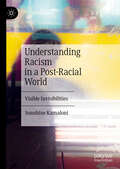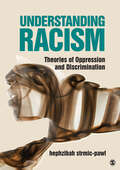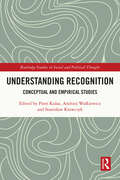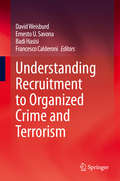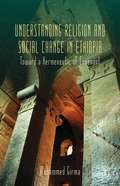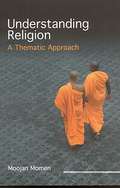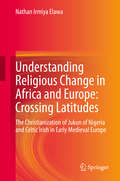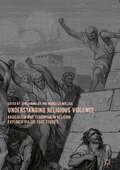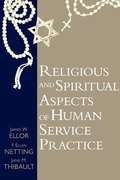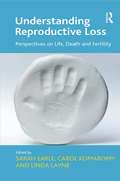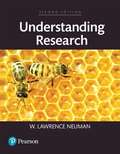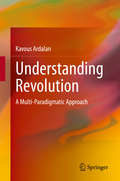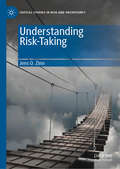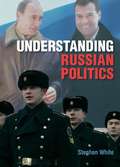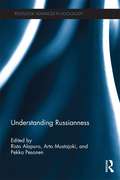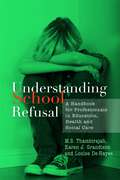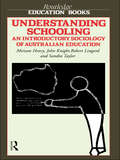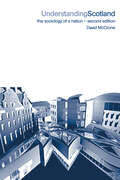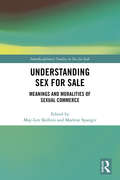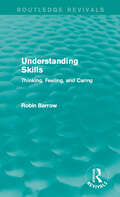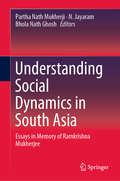- Table View
- List View
Understanding Racism in a Post-Racial World: Visible Invisibilities
by Sunshine KamaloniThis book addresses the question: how can we talk about race in a world that is considered post-racial, a world where race doesn’t exist? Kamaloni engages with the tradition of everyday racism and traces the process of racialisation through the interaction of bodies in space. Exploring the embodied experience exposes the idea of post-racialism as a response to continued cultural anxieties about race and the desire to erase it. Understanding Racism in a Post-Racial World presents a broader question about what everyday encounters about race might tell us about the current cultural construction of race. The book provides a much-needed investigation of the intersection of race, bodies and space as a critical part of how bodies and spaces become racialised, and will be of value to students and scholars interested in understanding and discussing race across interdisciplinary areas such as cultural studies, communication, gender studies, geography, body studies, literature studies and urban studies.
Understanding Racism: Theories of Oppression and Discrimination
by Hephzibah Strmic-PawlRecipient of a 2022 Most Promising New Textbook Award from the Textbook & Academic Authors Association (TAA) The author is a proud sponsor of the 2020 SAGE Keith Roberts Teaching Innovations Award—enabling graduate students and early career faculty to attend the annual ASA pre-conference teaching and learning workshop. Understanding Racism systematically examines the theories and theorists that have contributed the most to our contemporary understanding of racism in its various forms—making it easier for students to understand the multiple dynamics of how racism operates. In every chapter, activist and award-winning sociologist Hephzibah Strmic-Pawl describes the emergence of a theory and the problem it addresses; discusses the scholars who are most closely associated with the theory; and explores the strengths and limitations of the theory. From foundational theories such as Prejudice and White Privilege to contemporary theories such as Color-Blind Racism, Understanding Racism is the first text to present thirteen approaches for explaining racism in one book. The book′s systematic organization and pedagogical features will help students think theoretically about race and racism at different levels of analysis, as well as reflect and discuss how to challenge racism.
Understanding Racism: Theories of Oppression and Discrimination
by Hephzibah Strmic-PawlRecipient of a 2022 Most Promising New Textbook Award from the Textbook & Academic Authors Association (TAA) The author is a proud sponsor of the 2020 SAGE Keith Roberts Teaching Innovations Award—enabling graduate students and early career faculty to attend the annual ASA pre-conference teaching and learning workshop. Understanding Racism systematically examines the theories and theorists that have contributed the most to our contemporary understanding of racism in its various forms—making it easier for students to understand the multiple dynamics of how racism operates. In every chapter, activist and award-winning sociologist Hephzibah Strmic-Pawl describes the emergence of a theory and the problem it addresses; discusses the scholars who are most closely associated with the theory; and explores the strengths and limitations of the theory. From foundational theories such as Prejudice and White Privilege to contemporary theories such as Color-Blind Racism, Understanding Racism is the first text to present thirteen approaches for explaining racism in one book. The book′s systematic organization and pedagogical features will help students think theoretically about race and racism at different levels of analysis, as well as reflect and discuss how to challenge racism.
Understanding Recognition: Conceptual and Empirical Studies (Routledge Studies in Social and Political Thought)
by Piotr KulasAs the concept of recognition shifts from philosophical theory to other fields of the humanities and social sciences, this volume explores the nature of this border category that exists in the space between sociological and philosophical considerations, related as it is to concepts such as status, prestige, the looking-glass self, respect, and dignity - at times being used interchangeably with these terms. Bringing together work from across academic disciplines, it presents theoretical conceptualizations of recognition, demonstrates its operationalization in historical and literary research, considers recognition as a fundamental problem of sociological theory and examines the concept as a marker of social distances and redistribution. An examination and demonstration of the full potential of recognition as a category, Understanding Recognition: Conceptual and Empirical Studies explores the contemporary meanings and manifestations of recognition and sheds light on its capacity to complement the notions of status, class or prestige. As such, it will appeal to scholars of sociology and social theory, philosophy, history and literary studies.
Understanding Recruitment to Organized Crime and Terrorism
by David Weisburd Francesco Calderoni Badi Hasisi Ernesto U. SavonaThis volume provides insights on how recruitment patterns develop for two related types of criminal networks: organized crime and terrorism. It specifically explores the social, situational, psychological, and economic drivers of recruitment. Although organized crime networks and terrorism networks can differ in underlying goals and motivations, this volume demonstrates common drivers in their recruitment, which will provide insights for crime prevention and intervention. The goal of the book is to explore the current knowledge about these common drivers, as well as highlight emerging research, to identify and prioritize a research agenda for scholars, as well as policymakers. The research presented in this work aims to fill existing gaps in the knowledge of recruitment to both organized crime and terrorism. For each area, it provides a systematic review of the existing research on social, psychological, and economic drivers of recruitment. It then presents findings from independent original research aimed to explore new ground not covered in these previous studies. The contributions to this volume were the result of a research project funded by a European Union Horizon 2020 grant, and present a diverse, international mix of expertise and cases. It will be of interest to researchers in criminology and criminal justice, as well as related fields such as sociology, psychology, and international relations. Chapter 13 of this book is available open access under a CC BY 4.0 license.
Understanding Religion and Social Change in Ethiopia
by Mohammed GirmaReligiosity is one aspect without which Ethiopian society cannot be fully understood. This book aims to map out the terrain of the discourse in religion-social change nexus in Ethiopian using the notion of covenant as an interpretive tool.
Understanding Religion: A Thematic Approach
by Moojan MomenWith the aid of hundreds of photographs, an in-depth exploration of the role of religionAn innovative, thematic presentation of the role of religion in human society, from traditional cultures to the modern world, this comprehensive account will prove invaluable for students, experts or the interested general readers seeking an understanding of the nature and significance of diverse religious experience. Drawing from all major religious traditions in the world, as well as a variety of non-religious disciplines such as psychology, philosophy and sociology, Momen's informative study covers everything from art and history to theology and the World Wide Web.
Understanding Religious Change in Africa and Europe: The Christianization of Jukun of Nigeria and Celtic Irish in Early Medieval Europe
by Nathan Irmiya ElawaThis book examines and compares the religious experience of an African group with a European one. It offers an ethnographical investigation of the Jukun of north central Nigeria. The author also organically weaves into the narrative the Christianization of the Irish in a comparative fashion. Throughout, he makes the case for an African Christianity connected to a Celtic Irish Christianity and vice-versa -- as different threads in a tapestry. This work is a product of a synthesis of archival research in three continents, interviews with surviving first-generation Christians who were active practitioners of the Jukun indigenous religion, and with former missionaries to the Jukun. On the Irish side, it draws from extant primary sources and interviews with scholars in Celtic Irish studies. In addition, pictures, diagrams, and excerpts from British colonial and missionary journals provide a rich contextual understanding of Jukun religious life and practices. The author is among the emerging voices in the study of World Christianity who advocate for the reality of "poly-centres" for Christianity. This perspective recognizes voices from the Global South in the expansion of Christianity. This book serves as a valuable resource for historians, anthropologists, theologians, and those interested in missions studies, both scholars and lay readers seeking to deepen their understanding of World Christianity.
Understanding Religious Ritual: Theoretical approaches and innovations (Routledge Advances in Sociology)
by Gadi WolfsfeldAlthough numerous studies of religious rituals have been conducted by religious studies scholars, anthropologists, sociologists, and psychologists, it is rare to find a work that brings scholars from different disciplines together to discuss the similarities and differences in their research. This book represents contributions by leading scholars from several disciplines that show the diversity of approaches to religious rituals, while also providing cross-disciplinary perspectives on this topic. The goals of the chapters are to consider where the field currently stands in understanding religious rituals and what novel ideas can improve our knowledge about these practices; and furnish innovative applications of theory by discussing particular examples which are drawn from the authors’ fieldwork. The chapters cover Christian, Buddhist, Jewish, and Islamic rituals, thus providing a view of how ritual practices vary across the globe, but also how they share some important characteristics.
Understanding Religious Violence: Radicalism and Terrorism in Religion Explored via Six Case Studies
by James Dingley Marcello MollicaThis book addresses the problem of religiously based conflict and violence via six case studies. It stresses particularly the structural and relational aspects of religion as providing a sense of order and a networked structure that enables people to pursue quite prosaic and earthly concerns. The book examines how such concerns link material and spiritual salvation into a holy alliance. As such, whilst the religions concerned may be different, they address the same problems and provide similar explanations for meaning, success, and failure in life. Each author has conducted their own field-work in the religiously based conflict regions they discuss, and together the collection offers perspectives from a variety of different national backgrounds and disciplines.
Understanding Religious and Spiritual Aspects of Human Service Practice
by F. Ellen Netting James Ellor Jane M. ThibaultContending that despite current efforts to make social workers sensitive to differences of race, ethnicity, and gender, the diversity and impact of religious beliefs has often been overlooked, three professors of social work/human services offer a guide to direct practice concerns. Spiritual assessment, positive and pathological uses of religious practice, and the need for spiritual self-awareness among human-service workers are explored, as are issues related to community, congregation, and making of public policy. Annotation c. Book News, Inc., Portland, OR (booknews.com)
Understanding Reproductive Loss: Perspectives on Life, Death and Fertility
by Carol KomaromyThe study of human reproduction has focused on reproductive ’success’ and on the struggle to achieve this, rather than on the much more common experience of ’failure’, or reproductive loss. Drawing on the latest research from The UK and Europe, The United States, Australia and Africa, this volume examines the experience of reproductive loss in its widest sense to include termination of pregnancy, miscarriage, stillbirth, perinatal and infant death, as well as - more broadly - the loss of desired normative experiences such as that associated with infertility, assisted reproduction and the medicalisation of 'high risk' pregnancy and birth. Exploring the commonalities, as well as issues of difference and diversity, Understanding Reproductive Loss presents international work from a variety of multi-disciplinary perspectives and will appeal to sociologists, anthropologists and other social scientists with interests in medicine, health, the body, death studies and gender.
Understanding Research (Second Edition)
by W. Lawrence NeumanUnderstanding Research is an introduction to research. W. Lawrence Neuman shows students that the subject is both interesting and highly relevant to their lives and professional work. The Second Edition makes the essentials of doing high-quality research accessible, in ways that create excitement about the research process. Core principles, processes, and procedures of research are distilled – and presented with salient real-world examples and the latest academic studies – in a manner that students will want to learn them. For courses in Experimental Methods and in Research Methods for Political Science and Sociology.
Understanding Revolution: A Multi-Paradigmatic Approach
by Kavous ArdalanThis book applies a multiparadigmatic philosophical frame of analysis to the topic of social revolution. Crossing two disciplines and lines of literature—social philosophy and social revolution—this book considers different aspects of social revolution and discusses each aspect from four diverse paradigmatic viewpoints: functionalist, interpretive, radical humanist, and radical structuralist. The four paradigms are founded upon different assumptions about the nature of social science and the nature of society. Each paradigm generates theories, concepts, and analytical tools that are different from those of other paradigms. An understanding of different paradigms leads to a more balanced understanding of the multi-faceted nature of the subject matter.In this book, the first chapter reviews the four paradigms. Using the Iranian Revolution as exemplar, the next few chapters provide paradigmatic explanations for a particular aspect of revolution: culture, religion, ideology. With this background, the book introduces a comprehensive approach to the understanding of revolution. The final chapter concludes by recommending further paradigmatic diversity. This book will be of particular interest to students and researchers interested in social revolution, political sociology, and political theory.
Understanding Risk-Taking (Critical Studies in Risk and Uncertainty)
by Jens O. ZinnThis book outlines and systematises findings from a growing body of research that examines the different rationales, dimensions and dynamics of risk-taking in current societies; providing insight into the different motivations and social roots of risk-taking to advance scholarly debates and improve social regulation. Conceptually, the book goes beyond common approaches which problematise socially undesirable risk-taking, or highlight the alluring character of risk-taking. Instead, it follows a broadly interpretivist approach and engages in examining motives, control, routinisation, reflexivity, skills, resources, the role of identity in risk-taking and how these are rooted in and framed by different social forces. Zinn draws on qualitative studies from different theoretical and conceptual backgrounds such as phenomenology, hermeneutics, pragmatism, feminism, class analysis, theory of practice and discourse analysis among others, to outline key distinctions and concepts central to the understanding of risk-taking. It will be a key resource for everyone who is concerned with the understanding and management of risk-taking in all kinds of social domains, such as immigration, youth, leisure sports, crime, health, finance, and social policy.
Understanding Russian Politics
by Stephen WhiteA fresh and compelling interpretation of Russian politics by a leading authority, this textbook focuses on political developments in the world's largest country under Putin and Medvedev. Using a wealth of primary sources, it covers economic, social and foreign policy, and the 'system' of politics that has developed in recent years. Opposing arguments are presented and students are encouraged to reach their own judgements on key events and issues such as privatisation and corruption. This textbook tackles timely topics such as gender and inequality issues; organised religion; the economic krizis; and Russia's place in the international community. It uses numerous examples to place this powerful and richly-endowed country in context, with a focus on the place of ordinary people which shows how policy is translated to Russians' everyday lives.
Understanding Russianness (Routledge Advances in Sociology)
by Risto Alapuro Arto Mustajoki Pekka PesonenIn today’s world where other cultures are being tapped to a greater extent than ever before, the processes of mixing and matching are especially relevant in making sense of Russia. Not only do borrowing and assimilation, interaction between the familiar and the alien, constitute a venerable tradition in Russian culture, but during the two last post-Soviet decades a notable Western influence has become apparent. This book provides means for understanding Russianness in this new situation. By bringing together Russian and Western, eminent and younger scholars it provides insights both from inside and outside. By extending its perspectives to three fields – linguistics, cultural studies, and social sciences – it covers different dimensions of creative misunderstandings , hybrids, tensions and other modes of adaptation in the Russian culture. By offering concrete case studies it avoids easy stereotypes, deconstructs clichés, problematizes accepted truths, and identifies points of interaction between Russia and the West.
Understanding School Refusal: A Handbook for Professionals in Education, Health and Social Care
by M. S. Thambirajah Karen J. Grandison Louise De-Hayes` Combining educational and clinical perspectives, and with extensive use of case studies, the authors present recent research into the mental health problems associated with school refusal, such as anxiety and panic attacks, as well as the role that parental support plays in their children's school life. They also discuss the role of home tuition services and pupil referral units in extreme cases of school refusal, and provides concrete strategies for planning and organising services to manage the problem effectively. Understanding School Refusal is a valuable guide for professionals across the disciplines of education, health and social care, and will also be useful for training courses within these fields.' Education Today School refusal is a crippling condition in which children experience extreme anxiety or panic attacks when faced with everyday school life and this handbook aims to explore and raise awareness of the problem of school refusal in children and young people, and provide plans and strategies for education, health and social care professionals for identifying and addressing this problem. Combining educational and clinical perspectives, and with extensive use of case studies, the authors present recent research into the mental health problems associated with school refusal, such as anxiety and panic attacks, as well as the role that parental support plays in their children's school life. They also discuss the role of home tuition services and pupil referral units in extreme cases of school refusal, and provides concrete strategies for planning and organising services to manage the problem effectively. Understanding School Refusal is a valuable guide for professionals across the disciplines of education, health and social care, and will also be useful for training courses within these fields.
Understanding Schooling: An Introductory Sociology of Australian Education
by Sandra Taylor John Knight Robert Lingard Miriam HenryFirst published in 1990. Routledge is an imprint of Taylor & Francis, an informa company.
Understanding Scotland: The Sociology of a Nation
by David McCroneUnderstanding Scotland has been recognised since publication as the key text on the sociology of Scotland. This wholly revised edition provides the first sustained study of post-devolution Scottish society. It contains new material on:* the establishment of the Scottish parliament in 1999* social and political data from the 1997 general elections* the new cultural iconography of Scotland* Scotland as a European society.For anyone wishing to understand Scottish society in particular or the general issues involved in nation building, McCrone's clear-headed coherently argued account of the main issues will be essential reading.
Understanding Sex for Sale: Meanings and Moralities of Sexual Commerce (Interdisciplinary Studies in Sex for Sale)
by Marlene Spanger May-Len SkilbreiThe problem of prostitution, sex work or sex for sale can often be misunderstood, if we do not take into consideration its spatial, temporal and political context. Understanding Sex for Sale aims to understand how prostitution, sex work or sex for sale are delineated, contested and understood in different spaces, places and times; with a particular focus on identifying how the relation between sex and money is interpreted and enacted. Divided into three parts, this interdisciplinary volume offers contributions that discuss ongoing theoretical issues and analytical challenges. Some chapters focus on how prostitution, sex work, or sex for sale have been regulated by the authorities and on the understandings that regulations are built upon. Other chapters investigate the experiences of sex workers and sex buyers, examining how these actors adjust to or resist the categorisation processes, control and stigma they are subjected to. Finally, a third group of chapters discuss contemporary definitional issues produced by various actors tasked with controlling prostitution or offering social services to its participants. Advancing and placing analytical tools at the forefront of the discussion, Understanding Sex for Sale appeals to undergraduate and postgraduate students, as well as researchers interested in fields such as, sociology, anthropology, criminology, history, human geography and gender studies.
Understanding Skills: Thinking, Feeling, and Caring (Routledge Revivals)
by Robin BarrowIt is widely agreed that education should involve the development of understanding, critical thinking, imagination, and emotions. However, this book, first published in 1990, argues that our views to these key concepts are confused and inaccurate, and therefore what we do in schools is generally inappropriate to our ideal. This book will be of interest to students of education and philosophy.
Understanding Social Divisions
by Shaun BestThe study of social divisions has dominated research within the social sciences since the nineteenth century. Early stratification categories of class, race, and gender, have in more recent years been joined by issues such as sexuality and disability. Understanding Social Divisions addresses the full range of social divisions in one volume while also considering the nature of social division in itself, in a comprehensive and accessible overview. Shaun Best: outlines and evaluates theories and research from a long historical period looks at how social divisions influence the formation of identity and `the other′; discusses the mechanisms that are drawn upon to maintain social divisions; considers how solidarity is maintained given that most people in society may feel in some way divided from the rest of society; and, explores how individuals place themselves within the social divisions of class, gender, sex and sexuality, race and ethnic diversity, disability and mental illness. The concluding chapter explores the role of the State in the processes of social division, in areas such as: asylum, citizenship, childhood, old age, disease and policing of terrorism. This book is essential reading for students of social divisions from a wide variety of social science backgrounds.
Understanding Social Dynamics in South Asia: Essays in Memory of Ramkrishna Mukherjee
by N. Jayaram Partha Nath Mukherji Bhola Nath GhoshThis volume includes fourteen essays by eminent sociologists in memory of Ramkrishna Mukherjee (1919–2017), the last of the founding architects of sociology in India. It also includes two interviews with Ramkrishna Mukherjee by senior sociologists. The essays cover a variety of themes and topics close to the works of Ramkrishna Mukherjee: the idea of unitary social science, methodology of social research, the question of facts and values, rural society and social change, social mobility, family and gender, and nationalism. In the two interviews included here Mukherjee clarifies his intellectual trajectory as well as issues of methodology and methods in social research. Overall, this volume endorses his emphasis on the need for social researchers to transcend the ‘what’ and ‘how’ to ‘why’ in the pursuit of sociological knowledge. The volume is a valuable addition to the history of sociology in India. Students of sociology and other social sciences will find it useful as a book of substantive readings on social dynamics; those researching the social world will find in it a useful guide to issues in designing and execution of social research projects.
Understanding Social Enterprise
by Rory Ridley-Duff Mike BullThe emergence of social enterprises over the past 25 years has been an exciting and significant development in the economy at a local, national and international level. How should we understand the growing popularity of social enterprise? Are alternative business models even more relevant in an uncertain business climate? How does Social Enterprise fit into the wider social context? In 12 comprehensive chapters the authors discuss and illustrate both theoretical and practical considerations for the field. The book: - Focuses on different and distinct approaches to Social Enterprise and social economy - Contains comprehensive coverage of employee-owned, cooperative, community and charitable enterprises - Looks at private, voluntary and public sector differences. - Examines managerial issues for social enterprises: strategic thinking, leadership, HRM, governance and globalisation. - Draws on international debates and examples. - Includes extensive learning features such as: summaries, international case studies, reflection boxes, further reading and links to online information about social enterprise projects. - Is accompanied by a companion website with a full instructors " manual, including PowerPoint slides and extra case studies for lecturers, and access to full-text journal articles for students.
